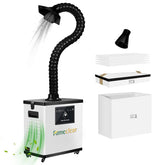The Ultimate Guide to Home Welding Fume Evacuators: FumeClear® FC-100A Fume Evacuator
Home Welding Fume Evacuators
When it comes to home welding, safety should always come first. Whether you are an experienced welder or just starting a DIY project, ensuring proper ventilation is crucial to protecting yourself from harmful fumes. That’s where the FumeClear® FC-100A Smoke Evacuator comes in, providing a tailor-made solution for the home studio.

Understand the importance of welding fume purification
When welding, various harmful substances can be produced, including:
- Metal Fumes: Generated when the metal being welded vaporizes, these fumes can contain hazardous metals such as zinc, lead, chromium, and nickel.
- Ozone: Formed when ultraviolet light from the welding arc reacts with oxygen molecules in the air, ozone can irritate the respiratory system.
- Nitrogen Oxides: Created when the high temperatures of welding cause nitrogen in the air to react with oxygen, these gases can cause respiratory irritation and contribute to lung diseases.
- Carbon Monoxide: Produced when insufficient oxygen is available during welding, carbon monoxide is a colorless, odorless gas that can cause headaches, dizziness, and even death in high concentrations.
- Welding Flux: Used to protect the weld area from atmospheric contamination, flux can release harmful gases and particulates when heated, leading to respiratory issues.
 .
.
Common symptoms include:
Respiratory Irritation: Including coughing, wheezing, chest tightness, and shortness of breath.
Eye Irritation: Watery eyes, redness, itching, and sensitivity to light.
Skin Irritation: Contact with welding fumes or splatter can cause skin irritation, rash, or burns.
Nausea and Headaches: Exposure to certain welding fumes may cause nausea, headaches, dizziness, or even loss of consciousness.
Long-term Health Effects: Prolonged exposure to welding fumes can increase the risk of developing chronic respiratory conditions, such as asthma, bronchitis, or even lung cancer.
FumeClear® FC-100A: The Ultimate Home Welding Fume Evacuator
Designed for DIY enthusiasts and small workshops, the FumeClear® FC-100A provides powerful yet compact fume extraction. Its cutting-edge features make it an indispensable tool for ensuring a safe and healthy work environment.

Key features of FumeClear® FC-100A
- High-Efficiency Filtration: The FC-100A features advanced filters, including HEPA and activated carbon, to effectively capture and neutralize harmful smoke and particulate matter.
- QUIET OPERATION: Unlike traditional industrial-grade extractors, the FC-100A operates quietly, allowing you to focus on your project without unnecessary noise distractions.
- Compact and Portable Design: The FC-100A has a compact footprint, lightweight structure, and is easy to move, making it suitable for small spaces such as home studios and garages.
- Adjustable Suction: No matter your lightweight welding process, the FC-100A offers adjustable suction to meet every need.
- EASY MAINTENANCE: Designed for easy maintenance, the FC-100A features easy-to-access filters and intuitive controls for hassle-free operation.

How to choose a smoke evacuator that suits your needs
When choosing a welding fume evacuator for your home studio, there are several factors you should consider to ensure optimal performance and safety:
- Filtration efficiency: Look for extractors with high-efficiency filters capable of capturing particles and gases.
- Size and portability: Consider the size and portability of your extractor, especially if your workshop has limited space.
- Noise level: Choose a pumping unit that operates quietly to minimize disruption during work.
- Adjustable Settings: Choose an extractor with adjustable suction and fan speed to suit different welding applications.
- Ease of Maintenance: Prioritize extractors with easily accessible filters and simple maintenance procedures to ensure longevity.
* Frequently asked questions about home welding fume extractors
Q1: How often should the filter of a household range hood be replaced?
Filter life depends on the intensity of use, but filters should generally be inspected and possibly replaced every 3-6 months.
Q2: Is a household welding fume extractor expensive?
While there are upfront costs, there are many affordable models suitable for home use that balance efficiency with expense.
Q3: Can I use a general purpose shop vacuum instead of a specialized fume evacuator?
While shop vacs can remove visible dust and debris, they are not designed to filter the tiny particles found in welding fumes. For adequate protection, a dedicated smoke evacuator is required.














Leave a comment
Please note, comments need to be approved before they are published.